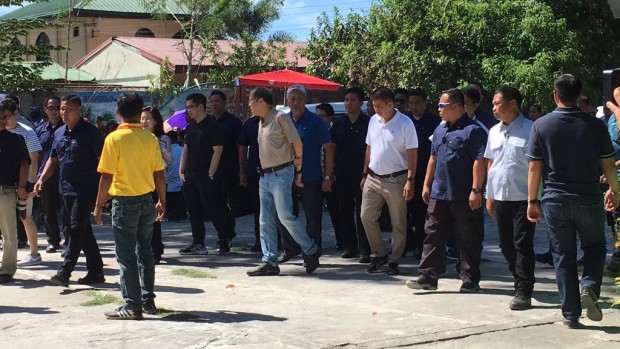Key facts on Philippine elections

President Benigno Aquino III arrives at Central Azucarera de Tarlac Elementary School in Tarlac City to vote. Photo by Nikko Dizon/Inquirer
The Philippines holds national elections on Monday, following six years of strong economic growth under President Benigno Aquino III who nevertheless has been criticized for failing to fix a devastating rich-poor divide.
Below are key facts and figures on the Philippines and its political system:
The country and its political system
The Philippines became an independent nation in 1946, following more than 400 years as a colony of either Spain or the United States. National languages are Filipino and English.
Its system of government is a US-style democracy with a president, a bicameral legislature and an independent judiciary. A president is limited by the constitution to a single term of six years. Presidents and vice presidents are elected separately. A new constitution was written after a “People Power” revolution ousted dictator Ferdinand Marcos in 1986.
Article continues after this advertisementPeople and poverty
Article continues after this advertisementThe developing nation is plagued with widespread poverty, various insurgencies and corruption.
Unemployment is high and about 26 percent of its 102 million people live on $1 a day or less. Over 10 percent of the population lives overseas, seeking a better life abroad.
Elite rule
The country is run by remarkably few political families. A study released in April showed 70 percent of members of Congress belonged to a political dynasty.
Political activists and analysts say elite rule and celebrity politics are set to be deeply entrenched in these elections. They cite as an example the likely dominance of powerful politicians’ relatives of the 12 available Senate seats. Boxing hero Manny Pacquaio is also likely to win a Senate seat.
Election figures
A total of 18,083 posts are being contested, most of which are local positions such as on town councils. There are also 1,634 town mayoral posts up for grabs, and 81 provincial governorships.
Half of the 24 seats in the Senate are also on offer, as are all the seats in the 286-member lower house.
There are 54 million Filipinos aged 18 or over who may vote. Voting is non-compulsory but elections since the fall of Marcos in 1986 have had high turnouts, averaging 76 percent.
Violence
Philippine politics has a long history of violence. Politicians, particularly at local and provincial levels, are willing to bribe, intimidate or kill to ensure they win. Communist rebels also carry out attacks to extort money from political candidates.
At least 15 people have been killed in election-related violence this year, according to police.
RELATED STORIES
Cebu town mayoralty candidate accused of vote-buying